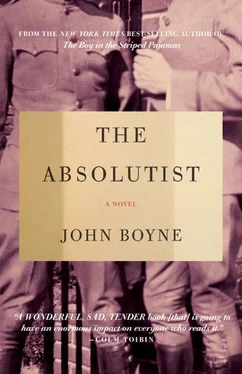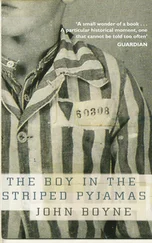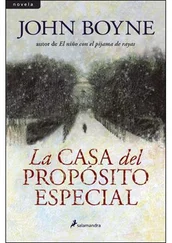By now it was time to start making my way back towards the boarding house in order to freshen up before my appointment. I walked away from the cathedral and took a different route, turning left and right on the criss-crossing streets.
It was I who had initiated the correspondence with Marian Bancroft. Although we had never met, Will had spoken of her often and I envied their extraordinary closeness. I had a sister myself, of course, but she had been only eleven when I left home, and even though I had written to her shortly after, my letters never received any reply; I suspected that they were intercepted by my father before they could reach her. But did he read them himself, I often wondered? Did he steal them away and tear open the envelopes, scanning my scrawling handwriting for news of where I was and how I was scraping a living together? Was there even a part of him that wondered whether one day my letters might stop, not because I had given up writing, but because I was no longer alive, the streets of London having swallowed me whole? It was impossible to know.
The war had been over for almost nine months by the time I finally plucked up the courage to write to Marian. It had been on my mind for a long time, a sense of responsibility that had kept me awake night after night as I tried to decide what to do for the best. A part of me wanted to dismiss her from my thoughts entirely, to pretend that she and her family did not exist. What help could I be to them, after all? What possible comfort could I offer? But the idea lingered and one day, tortured by guilt, I purchased what I considered to be an elegant packet of notepapers and a new fountain pen—for I wanted her to think well of me—and composed a letter.
Dear Miss Bancroft,
You don’t know me, or maybe you do, maybe you have heard my name mentioned, but I was a friend of your brother, Will. We trained together before we were sent over there. We were in the same regiment so we knew each other well. We were friends.
I must apologize for writing to you out of the blue like this. I don’t know what you’ve been going through over these last couple of years, I can’t imagine it, but I know that your brother is never very far from my thoughts because, no matter what anyone says, he was the bravest and kindest man I ever knew and there were plenty of brave men out there, I can promise you that, but not so many kind ones.
Anyway, I write to you now because I have something belonging to Will that I thought I should return. The letters you wrote to him while he was over there. He kept them all, you see, and they fell to me. Afterwards, I mean. On account of our friendship. I assure you that I’ve never read any of them. Only I thought that you might like them back.
I should have written before now, of course, but the truth is I haven’t been well since my return and have had to take a little time for myself. Perhaps you can understand that. That’s all over now, I think. I don’t know. I’m not sure about things when I look to the future. I don’t know if you are; I know I’m not.
I didn’t mean to write so much really, I just wanted to introduce myself and say that if perhaps you would permit me to call on you some day, then I should very much like to do so and I could return the letters to you, for I wonder if it might not give you some degree of comfort when you think of your brother.
Maybe you come to London sometimes. I don’t know if you do or not, but if you don’t I wouldn’t mind coming to Norwich. I hope this letter reaches you safely; you might have moved for all I know. I heard that sometimes in these cases people move because of all the trouble that comes about.
If you would write to me, I would like to set this matter right. Or, if you prefer not to meet, I could put the letters in a box and send them along to you. Only I hope you do agree to meet me. There are so many things I would like to tell you.
Your brother was my best friend, I said that already, didn’t I? Anyway, I know this much, that he was no coward, Miss Bancroft, he was no coward at all. He was a braver man than I will ever be.
I didn’t mean to write so much. But there’s a lot to say, I think.
With respectful wishes, Tristan Sadler
Without realizing it, I had walked directly past my turning for Recorder Road and found myself standing on the Riverside, staring across from where the stone pillars of Thorpe rose up to greet me. I found that my feet were taking me across the river and inside the station and I stood quietly, watching the people as they purchased their tickets and made their way towards the platforms. It was five minutes past twelve and there in front of me was the London train, set to go in another five minutes’ time. A conductor was walking up and down crying, “All aboard!” and I put my hand in my pocket for my wallet, looking at the ticket that I was carrying for my return journey later that evening. My heart raced when I saw that it was valid all day. I could simply climb on board and go home, put the whole wretched business behind me. I would have lost my holdall, of course, but there was not much in it, just yesterday’s clothes and the Jack London book. I could forward Mrs. Cantwell what I owed her and apologize for leaving without a word.
As I hesitated, a man approached me, hand extended, and asked whether I had any spare change. I shook my head, stepping back a little as he reeked of stale sweat and cheap alcohol; he walked on crutches for his left leg was missing, while his right eye was sealed over as if he had recently been in a fight. He wasn’t a day over twenty-five.
“A few pennies, that’s all,” he said, growling at me. “Fought for my country, didn’t I, and look how they left me. You can spare some change, can’t you? Come on, you fucking bastard!” he cried, raising his voice now and shocking me with the unexpected vulgarity. “You can spare a few pennies for them what gave you freedom.”
A lady who was passing by with a small boy immediately covered his ears and I noticed him staring at the man in rapt fascination. Before I could say anything to the man he lunged at me and I stepped back again at the very moment that a constable appeared and took a hold of him—gently, as it turned out—and said, “Come along, that’s not going to solve anything, now is it?” And with that platitude, the man seemed to crumple inside himself and moved away, hobbling back towards the wall and returning to a seated position on the ground, where he became almost catatonic, holding his hand out in the air, not even expecting anyone to help him.
“Sorry about that, sir,” said the constable. “He’s not usually much trouble so we let him stay there as he gets a few shillings most days. Ex-army, like myself. Had rather a rough time of it, though.”
“It’s quite all right,” I muttered, leaving the station, any thought of heading back to London quite gone now. I had come to do a job, it was important that I completed it. And it had nothing to do with the return of a packet of letters.
It was almost two weeks before I received a reply from Marian Bancroft and in the intervening time I had thought of little else. Her silence made me question whether she had received my note, whether her family had been forced to move to another part of the country, whether she simply wanted nothing to do with me. It was impossible to know and I was torn between regret at having written to her at all and a sense that I was being punished by her refusal to reply.
And then one evening, returning home late from a day of reading dreary, unsolicited manuscripts at the Whisby Press, I discovered a letter waiting for me under the door of my flat. I lifted it in amazement—I never received any post—and stared at the elegant handwriting, knowing immediately who it must be from, and went inside to make a cup of tea, staring at the envelope nervously as I did so and imagining the possible traumas that it might contain. Finally settled, I opened it carefully, removed the single sheet of paper, and was struck immediately by the faint smell of lavender that accompanied it. I wondered whether this was her particular perfume or whether she was a girl who stuck to the old-fashioned ways and put a drop of scent in her envelopes, regardless of whether she was writing a love letter, paying a bill or answering an unexpected correspondence such as my own.
Читать дальше












